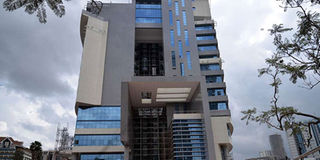Laxity in bank purchase leaves teachers with Sh2 billion mess

Mwalimu Towers. Besides the residential houses, Mwalimu National Savings and Credit Society also completed a 17-storey building worth Sh1.5 billion in Upper Hill, Nairobi. PHOTO | FILE | NATION MEDIA GROUP
What you need to know:
- Spire Bank has inadequate capital and needs to raise more money from shareholders to comply with the regulatory requirement of a minimum core capital of Sh1 billion.
- Spire has also been ranked as the least efficient among small banks. As of the third quarter ended September, the lender was spending Sh2.62 for every Sh1 of income.
The troubled Mwalimu National Savings and Credit Society, which has been hit by a loss of Sh2 billion it invested in Spire Bank, was last evening sinking into a deeper hole as it emerged that it is struggling to service a Sh500 million loan from a commercial bank that it used to finance a housing project in Kajiado.
Top managers at the teachers’ sacco yesterday put on a brave face that all was well, but sources told the Nation that the sacco has sold less than 10 houses despite the huge capital investment in the project.
As the gravity of the situation began to sink in, the Kenya Union of Post-Primary Education Teachers (Kuppet), through chairman Omboko Milemba, yesterday asked the government to step in and protect teachers’ investments and savings.
RECOVERY
But the outgoing chairperson, Ms Teresa Mutegi, said the Sh2 billion loss had been reversed.
“We were in that state a few years ago, but we have now reversed the situation and recorded an improvement. Our overall performance last year improved by 15 percent,” Ms Mutegi said.
Chief executive Alphonce Kaio admitted that there were challenges, but said that things are looking up “as we have reduced the losses we have been making”.
The sacco acquired Spire Bank, then known as Equatorial Commercial Bank, in 2015 from businessman Naushad Merali.
The more than 57,000 teachers who are members of the sacco were guided to invest a total of Sh2.4 billion for a 75 percent stake in the bank.
A string of losses has since devalued it to about Sh400 million, according to industry estimates.
KISAJU
On the housing project, Mr Kaio said about seven houses have been sold, but declined to disclose how many units are still up for sale.
The houses, which are going for between Sh2.9 million and Sh8.5 million, were to be sold exclusively to members, but a poor uptake forced management to offer them to non-members also.
The Kisaju, Kajiado County, development comprises 871 housing units valued at Sh2.9 billion. It stands on a 20-acre piece of land.
Besides the residential houses, Mwalimu sacco also completed a 17-storey building worth Sh1.5 billion in Upper Hill, Nairobi.
Our sister publication the Business Daily yesterday reported that Spire Bank has remained in loss territory since the Mwalimu purchase, whittling down its book value to Sh551.6 million as of September last year.
CAPITAL
The paper placed the bank’s worth at Sh413.7 million, representing a loss of Sh2 billion or 83 percent on the investment made three years ago.
Spire Bank has inadequate capital and needs to raise more money from shareholders to comply with the regulatory requirement of a minimum core capital of Sh1 billion.
The losses have, over the years, eaten into the bank’s core capital, which currently stands at negative Sh1.3 billion.
The lender has not paid dividends to shareholders since Mwalimu became a shareholder, adding to the weight of losses that teachers have had to bear from the transaction.
The Central Bank of Kenya (CBK) has, in recent years, shut down other lenders such as Chase Bank for capital breaches.
“We remain suspicious of some transactions that have occurred in this space as purchasers seem to struggle to turn around operations, although market conditions have worsened for the small lenders after the interest rate cap from 2016,” Standard Investment Bank (SIB) said in a research note this week.
“Mwalimu Sacco’s purchase of Equatorial Commercial Bank particularly comes to mind, with concern around the level of due diligence undertaken by the teachers’ union.”
DUE DILIGENCE
The buyout of the bank raised eyebrows when it became public, with various government agencies halting the deal, but later approving it.
It emerged that Mwalimu had agreed to make the acquisition without carrying out due diligence on the bank.
Spire has also been ranked as the least efficient among small banks. As of the third quarter ended September, the lender was spending Sh2.62 for every Sh1 of income.
The bank has made nearly Sh3 billion in net losses from January 2015 to September last year, eating into shareholder money, which is inadequate to meet the various minimum regulatory capital requirements.
The ratios, including those measuring liquidity and assets backing loans, fell short by a range of 6.5 percent to 17.3 percent.
PURCHASE
The bank’s capital position fell short even after making favourable adjustments to the more conservative international accounting standards IFRS9, which require banks to provide for expected loan losses rather than those already incurred.
The deepening breach of capital ratios means the lender is constrained in terms of various core banking operations, such as taking more deposits and expanding its loan book.
Also, Mwalimu can hardly reverse its losses by selling its controlling stake in the lender.
Small, loss-making banks have recently been acquired at steep discounts ranging from half of the book value to Sh100 (in the case of SBM Holdings’ buyout of Fidelity Bank).





